Humans have been using dogs as their hunting partners for ages. Historians claim that humans started using dogs for hunting before canine domestication. Deer hunting is a long-standing tradition in the United States. Nine states allow deer hunting with dogs.
Tracking dogs are powerful and agile with a strong sense of smell. They have a high prey drive and are receptive to training. Here are some tips that can help ensure a safe deer hunt with dogs.
Choose the right deer tracking dog breed.
Train your dog to trail deer. Training can include teaching basic commands and exposing your dog to deer scent.
Prepare for the hunt and take adequate safety measures. Carry a first aid box with you.
Explore the hunting grounds with your dog.
Here are 7 popular hunting dog breeds that are perfect for deer tracking.
Disclaimer: We do not support or promote hunting. This article is for informational purposes only, as we deeply respect and love all animals.
Deer Tracking Dog Breeds
1. American Foxhound
American foxhounds make excellent deer hunters. Thanks to their strong sense of smell and ability to track a wounded deer, they are well-suited for daytime drives. They possess the strength and stamina to track the animals unless they get exhausted.
American foxhounds have floppy ears, and they love being outdoors. They have a determined nature and keep following a scent until they reach their target. Due to their love for running, American foxhounds are called “running dogs.”
American Foxhounds as a Pet
As a pet, the American foxhound likes spending time with its family. It behaves well around children and other family members. They are good-natured, easygoing, and low-maintenance hounds. The members of this breed are mild and sweet buddies, unless you are a fox!
|
Height |
12 to 18 inches |
|
Life span |
11 to 13 years |
|
Group |
Hound group |
|
Trainability |
Moderately difficult |
|
Prey Drive |
High |
2. Labrador Retriever
Labrador retriever is one of the most popular dog breeds in America. Labs are highly energetic and smart pups that can go the extra mile when it comes to blood trailing deer. If you are planning a deer drive in winter, make sure to have a Labrador Retriever by your side.
They can withstand any sort of weather condition. Their compact built and short coat makes them excellent dogs for water work. On the hunt, Labs are usually quiet and focused. When asked to retrieve, they quickly bring the wounded game to the handler.
Labrador Retriever as a Pet
According to PetMD, Labs are adorable family dogs. These friendly pups love to go on adventures with their humans. Due to their quick learning ability, they are easy to train. They have a strong desire to please their owners with their sniffer talent.
|
Height |
21.5 to 14.5 inches |
|
Life span |
11 to 13 years |
|
Group |
Sporting group |
|
Trainability |
Easy to train |
|
Prey Drive |
High |
3. Beagle
Due to their exceptional sense of smell, Beagles are one of the best deer trackers on our list. Their constant baying helps you find the wounded or dead deer easily. What makes a Beagle perfect for trailing is their alert nature and intelligence.
Determination is an important trait in a hunting dog like a Beagle. Regardless of the climate conditions, a Beagle’s perseverance in the tracking game makes them a great partner for hunters. Also, they possess the energy required to assist you in your hunt drive throughout the day.
Pro Tip: While on a hunt, make sure your dog is alert and knows what is going on in the field so that other hunters don’t confuse them with the game animal.
Beagles as a Pet
Beagles are loyal and energetic pets. They have an affectionate and happy-go-lucky nature. A beagle will thrive happily in your backyard if it is getting regular exercise of two hours daily. That is why they are ideal for suburban and city dwellers. Their short coat requires minimal grooming.
|
Height |
13 to 15 inches |
|
Life span |
11 to 15 years |
|
Group |
Hound group |
|
Trainability |
Moderate |
|
Prey Drive |
High |
4. Mountain Cur
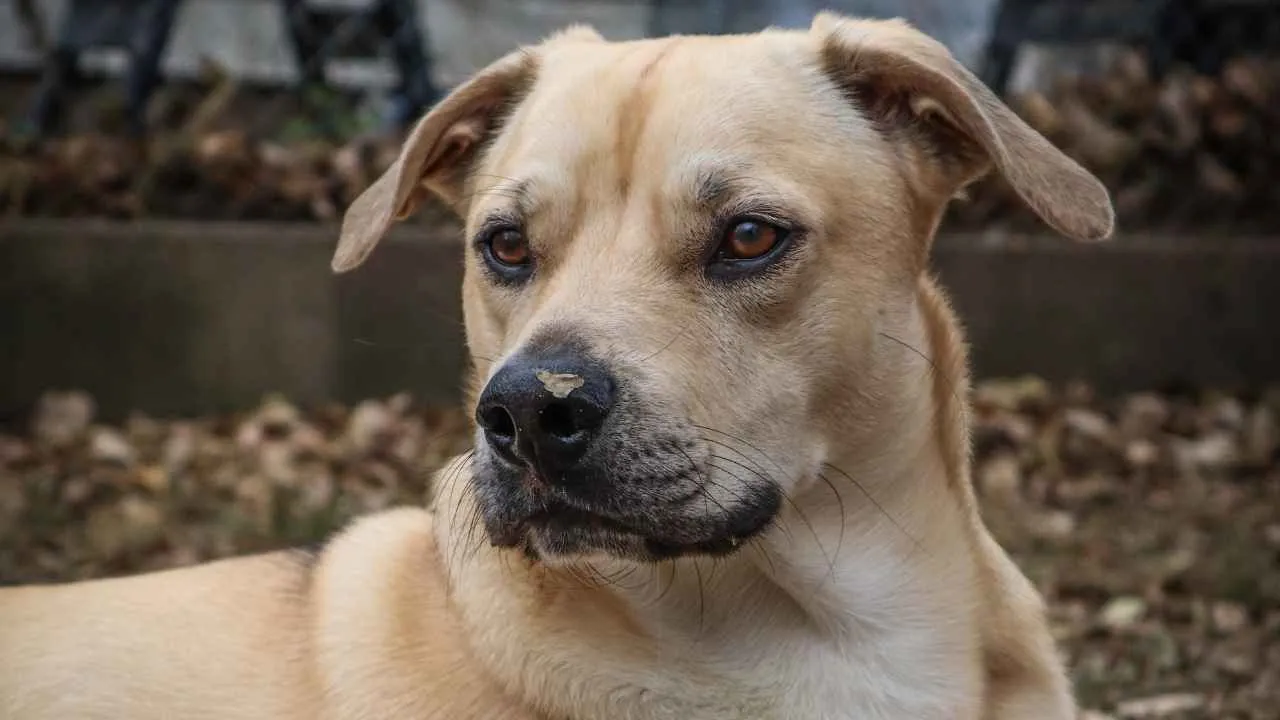
Mountain Curs were originally bred for hunting raccoons and squirrels in Ohio, Tennessee, and Virginia. Thanks to their high speed and endurance, they are serving as deer hunters today. Their extraordinary sense of smell makes them a pro at finding wounded deer.
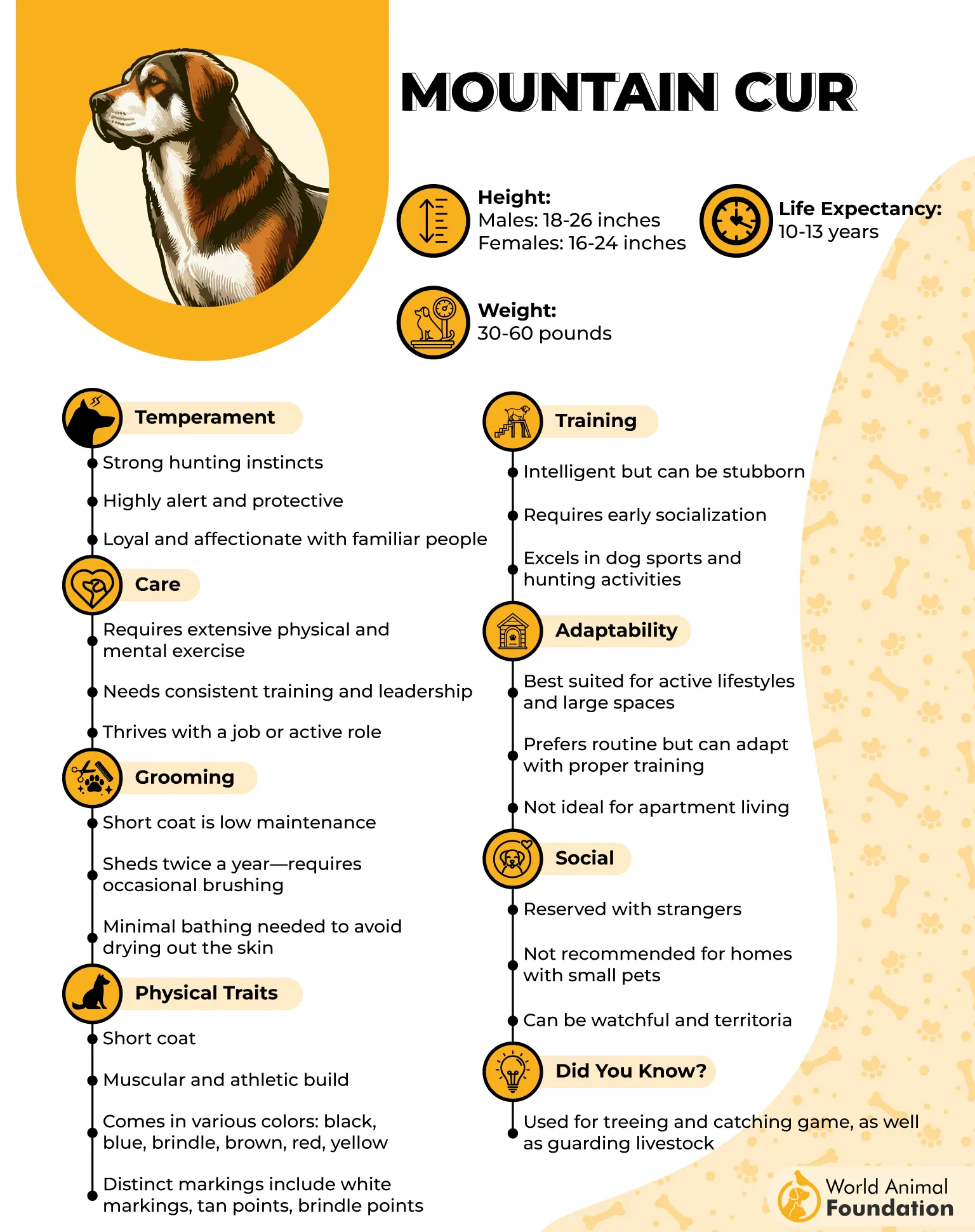
Also known as “All-American Pioneer Dog,” Mountain Curs have enhanced treeing instincts. They have high energy levels that enable them to gladly assist you on your hunting trip. Mountain Curs like to keep themselves busy, so you can train them for a wide range of tasks.
Mountain Curs as Pets
Mountain Curs make wonderful family pets and do great with children. They are the best for active households. The American Kennel Club recommends taking your dog on long walks and engaging them in physical and mental stimulation activities. Otherwise, they will get bored and destructive.
|
Height |
16 to 26 inches |
|
Life span |
10 to 13 years |
|
Group |
Hound group |
|
Trainability |
Easy to train |
|
Prey Drive |
High |
5. Bluetick Coonhound
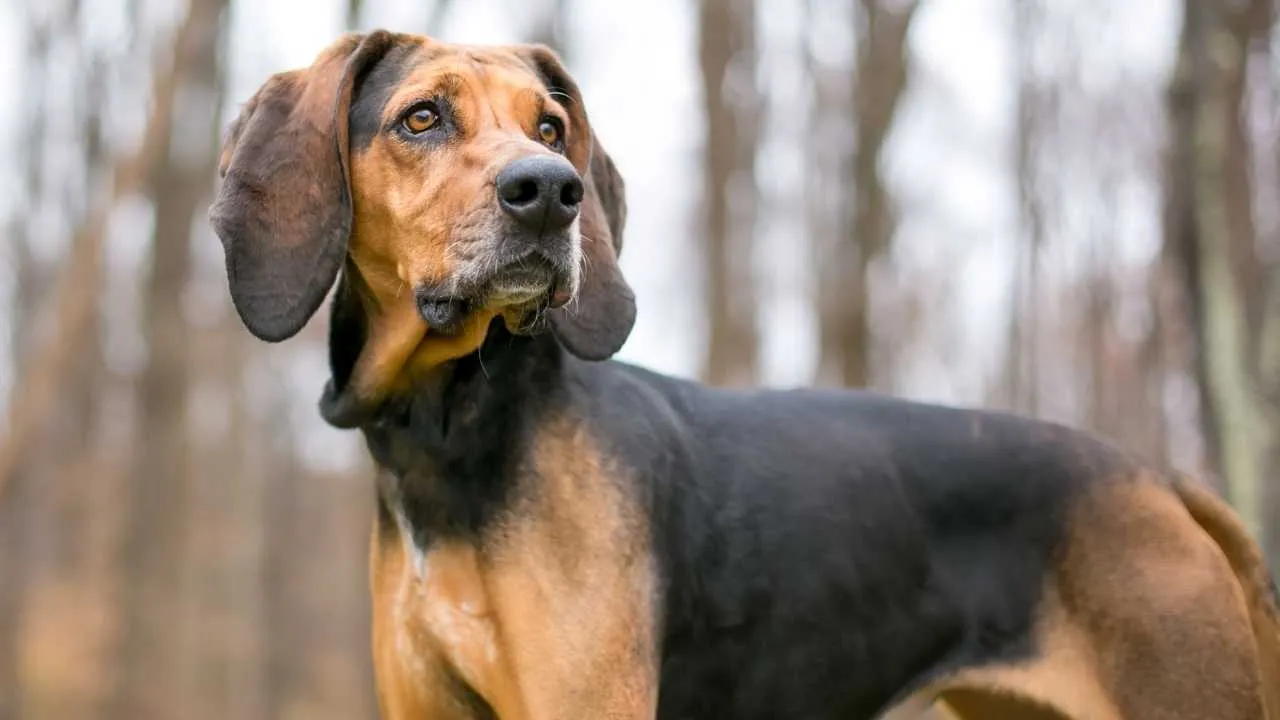
Commonly known for chasing mountain lions and cougars, Bluetick Coonhounds do not go easy on any deer they come across. Finding deer becomes an easy task due to their high energy, excellent noses, stamina, and high prey drive.
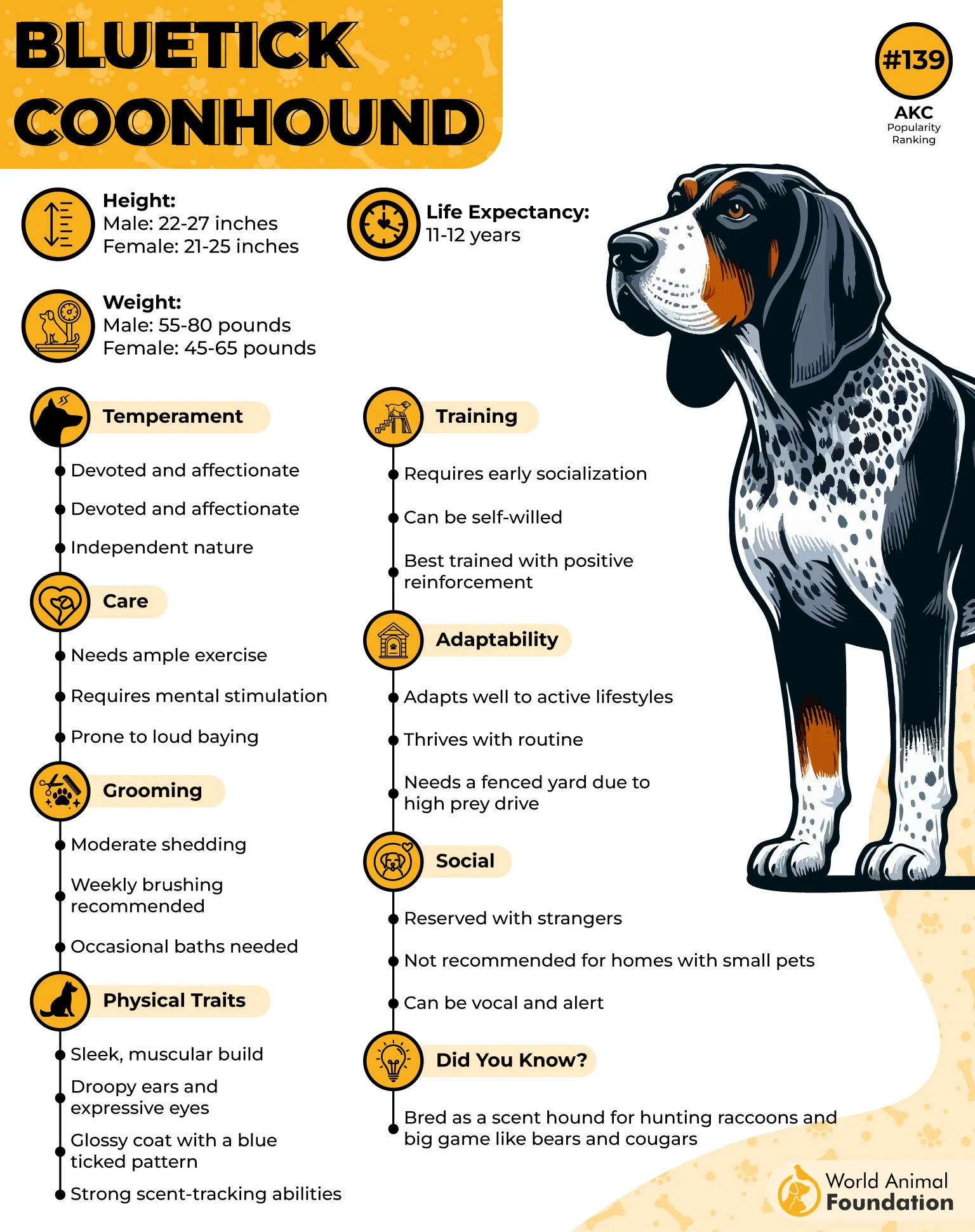
Bluetick Hounds can be very vocal even when they are not hunting. They can follow scent trails several miles and are an intelligent member of the hound group. Their high energy levels allow them to work for longer durations.
Bluetick Coonhounds as Pets
Bluetick coonhounds make an excellent pet for active families. Although they enjoy sleeping on their owner’s feet, Bluetick coonhounds tend to benefit from plenty of exercise. They are loyal and affectionate and behave well around older children.
|
Height |
21 to 27 inches |
|
Life span |
11 to 12 years |
|
Group |
Hound group |
|
Trainability |
Moderate |
|
Prey Drive |
Very High |
6. English Setter
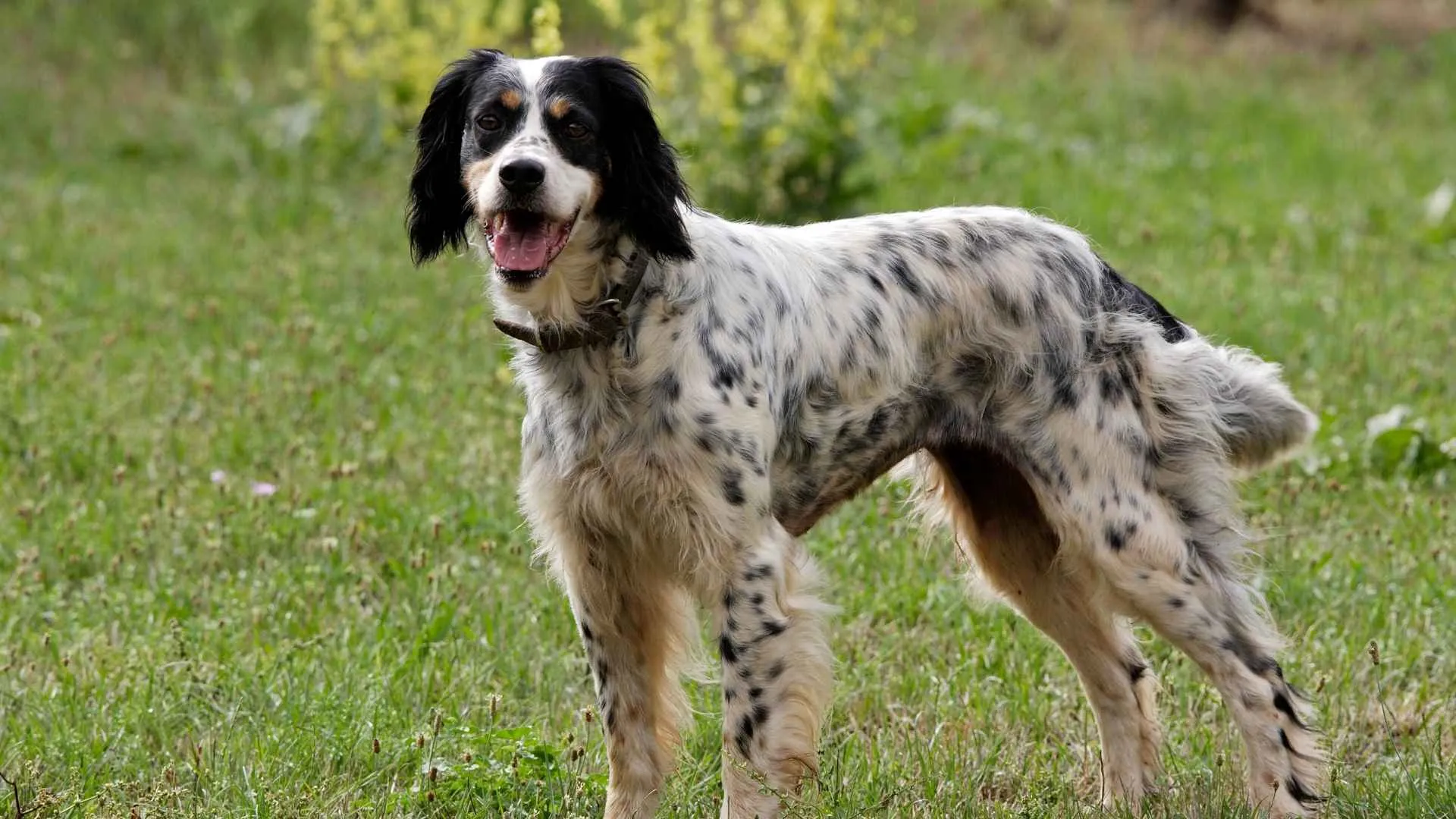
The English setter has served as a gun dog for 400 years in England. Primarily known for hunting birds, it is a big dog with a large head and silky fur. According to Britannica, this breed can be trained and used for blood trailing.
English setter can be split into two categories: conformation and field. Field dogs are highly skilled, light feathered, and make wonderful hunters. Conformation dogs, on the other hand, are long feathered and used as show dogs. They possess elegance, grace, and strength.
English Setters as Pets
As a pet, English setter loves staying by your side unless its time for you to go to work. After that, this dog will start locating its prey. They have a gentle temperament and a calm and friendly demeanor. They are easygoing and make good friends with kids and other pets.
|
Height |
23 to 27 inches |
|
Life span |
10 to 12 years |
|
Group |
Sporting group |
|
Trainability |
Moderately easy to train |
|
Prey Drive |
High |
7. Bloodhound
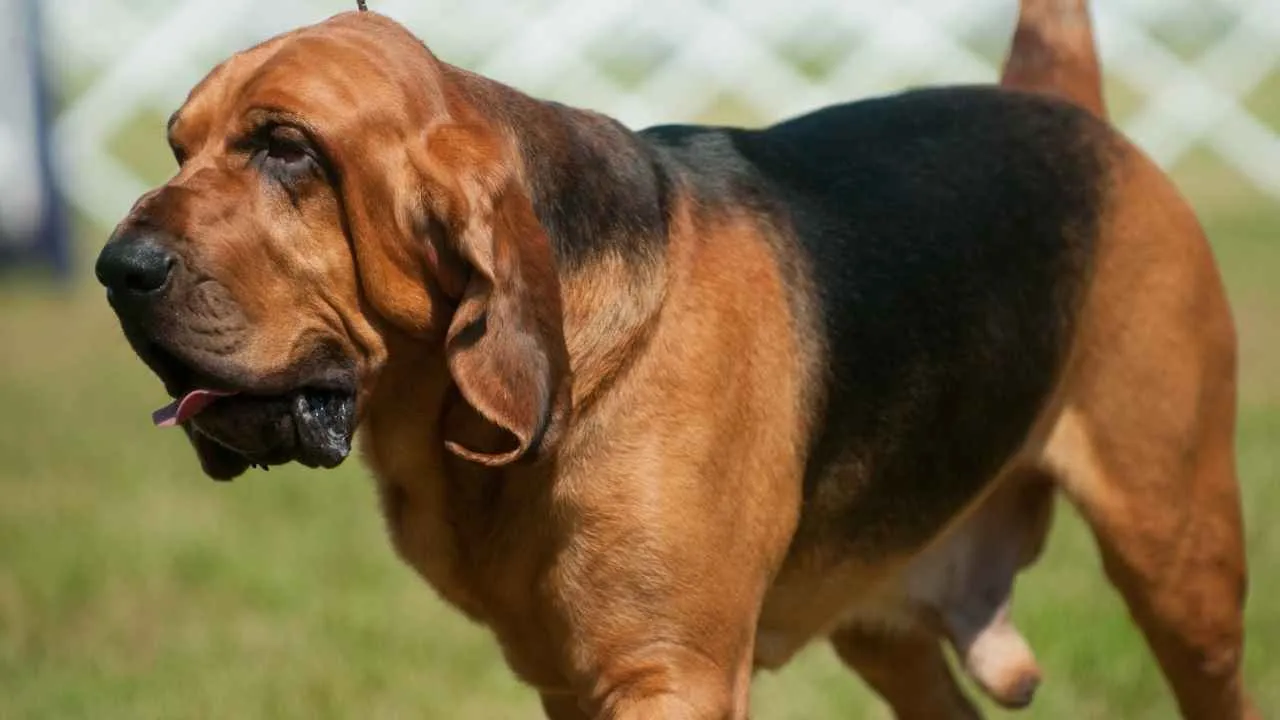
Bloodhound was originally bred for hunting deer and wild boar. It is a large dog with the strongest sense of smell of all breeds. That is why they do a wonderful job at scent tracking. Trainers use blood spray to train them for finding and killing deer.
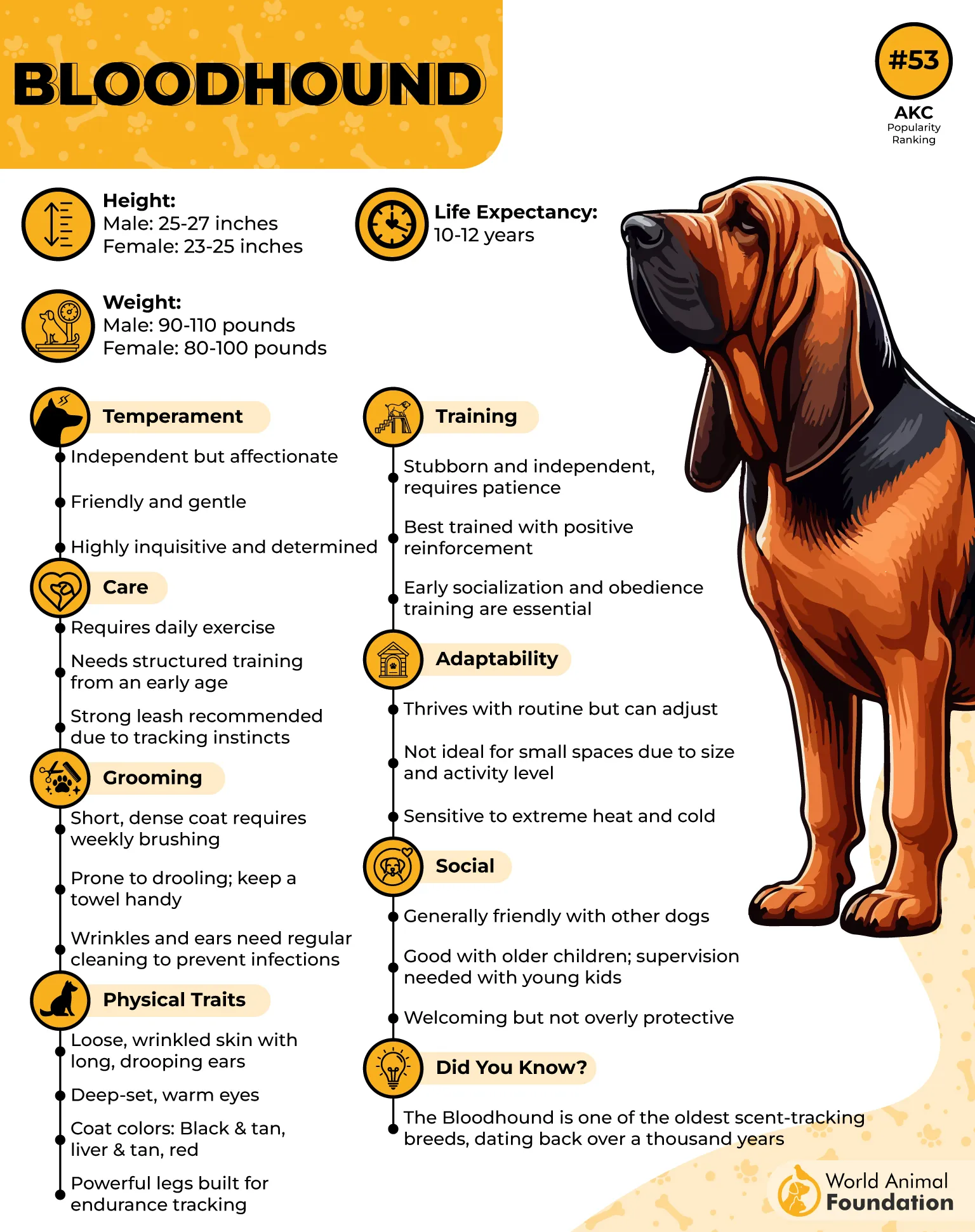
This breed is highly active. Today, police use bloodhounds for tracking missing persons. They are the pack dogs who like being surrounded by other dogs. Bloodhounds are perfect for hunters who prefer quality over quantity.
Bloodhounds as Pets
Bloodhound is a breed with wrinkly skin and long ears. They have gentle and laid-back personalities. With positive reinforcement, you can train your bloodhound to become a great family dog. These dogs need a lot of exercise to stay fit and healthy.
|
Height |
23 to 27 inches |
|
Lifespan |
10 to 12 years |
|
Group |
Hound group |
|
Trainability |
A bit stubborn, positive reinforcement can help |
|
Prey Drive |
High |
Conclusion
Have you ever heard of blood dogs? Several dog breeds are used for tracking and hunting deer. With proper training and socialization, these hunting dogs can make adorable pets. Make sure to get these breeds trained before adopting them. You can also take assistance from a dog trainer in this regard.

